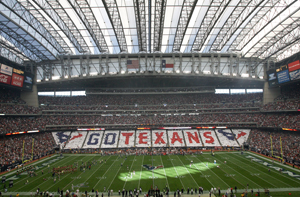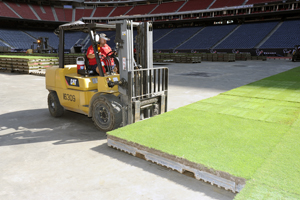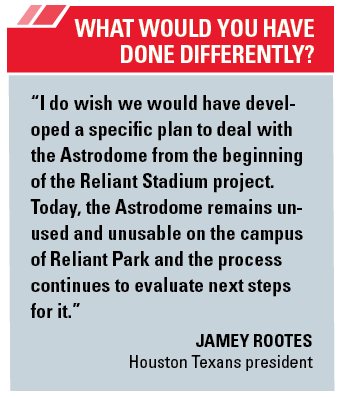Seven years before Cowboys Stadium took center stage in the NFL, the Houston Texans opened one of the league’s most sophisticated buildings.
Reliant Stadium became the first NFL facility featuring a retractable roof and a portable field. It served as the model for University of Phoenix Stadium, the home of the Arizona Cardinals, which opened in 2006 with both features. Since then, the Indianapolis Colts and Dallas Cowboys have also built stadiums with movable roofs.
The expansion Texans and the Houston Livestock Show & Rodeo, their co-tenant, struck a partnership to develop a multipurpose venue to suit both parties. The result: a $450 million project heavy on engineering technology to accommodate football, rodeo and other special events.
 |
The stadium’s retractable roof and portable field cater to football and Houston’s giant rodeo.
Photo by: Getty Images |
“We wanted an open-air stadium; the rodeo wanted a domed stadium,” said Texans President Jamey Rootes. “This was the compromise — an ability to open the roof and allow fans in the fall to experience football in an outdoor condition.”
As it turned out, however, the Texans discovered that their season-ticket holders preferred a climate-controlled environment, so for most NFL games, the roof remains closed, Rootes said.
The portable field system consists of hundreds of 8-foot-long sod trays that can be removed for other events. When the Texans are not playing, the trays are stored and maintained in a parking lot adjacent to the Astrodome.
“You take the grass out and it becomes a concrete floor and the rodeo builds from that,” Rootes said. “It was an important development that allowed us all to get what we wanted.”
In 2002, six years after the old Houston Oilers left town for Tennessee, a sold-out Reliant Stadium opened with 166 suites and 8,536 club seats. Every Texans game since then has sold out.
About 50 midfield suites are marketed for both Texans games and the rodeo. Those “combo” suites average $300,000 a year with long-term commitments, said John Schriever, the team’s vice president of ticketing and event management. The rest of the suites are sold individually between the two groups, and the same is true for most club seats.
Over the past decade, the stadium has gone through $30 million in upgrades, financed through a fund reserved for capital improvements. For football alone, the facility now has 186 permanent skyboxes to meet a Texas-size appetite for pro football.
One premium-seat addition completed five years ago proves how hot the NFL is in Houston. In 2007, the Texans found
 |
The field system consists of hundreds of sod trays that can be removed for other events.
Photo by: Houston Texans |
space at the top of the lower bowl between the 40 and 50 yard lines to build eight, 10-seat skyboxes. Those suites, moderately priced at $50,000 a season with six-year and 10-year terms, sold out in a month, team officials said. Those patrons have an obstructed view of the video boards in the lower bowl caused by the low ceiling from the suite level above. The tradeoff for buyers is being closer to midfield, according to Schriever.
The Chairmans Club and Directors Club, two end zone retrofits in the upper deck, converted $35 seats into all-inclusive ticket packages priced at $140 a game. The 500-seat Chairmans Club, tied to a $1,000 permanent seat license, debuts this season in the south end. About three-quarters of the stadium’s 71,500 seats are tied to PSLs.
The Texans also developed their version of the arena industry’s theater box concept, building groups of four premium seats in the end zone of the lower level that are marketed to season-ticket holders.
“We never want to find ourselves in a position where we’re so far behind we can’t catch up,” Rootes said. “You see that happening often with buildings. They fall into disrepair and then you’re in a bit of a death spiral. We have always tried to
keep that new stadium smell.”
As for projects on the drawing board, the Texans are in talks with Verizon, a founding partner of the team and the stadium, to expand Wi-Fi throughout the stadium. In addition, the Texans plan to replace Reliant’s original video boards with two new screens in 2013 and are taking bids for that project.
While Reliant Stadium was built with the NFL and rodeo in mind, the Texans formed Lone Star Sports and Entertainment to promote international soccer matches and college football games at the stadium.
The sold-out U.S.-Mexico soccer match in 2003 proved to be a watershed event for the venue and the market, building momentum for the stadium to book more high-profile soccer events. Three years later, the old MLS San Jose Earthquakes relocated to Houston.
“It became clear that Houston was a great soccer market, so the Dynamo was launched and this year they opened BBVA Compass Stadium,” Rootes said. “We like to think that with our success in promoting soccer we had a hand with a new sports entity in Houston that we are proud of.”
RELIANT STADIUM
ORIGINAL COST: $450 MILLION
| | 2002 | 2012 |
| Luxury suites | 166 | 186 |
| Luxury suite seats | 2,976 | 3,577 |
| Club seats | 8,536 | 8,536 |
| Club lounges | 2 | 4 |
| General concessionaire | Aramark | Aramark |
| Premium caterer | Aramark | Aramark |
| Concessions points-of-sale | 600 | 600 |
| Soda pouring rights | Coca-Cola | Coca-Cola |
| Permanent novelty stands | 27 | 27 |
| Team store | 1 | 1 |
| Parking spaces | 26,000 | 26,000 |
| TV monitors | 1,600 | 1,551 |
Note: In addition to the Go Texan Store, the team has four club-level stores, 10 in-line retail stands, and 10 portable kiosks.






